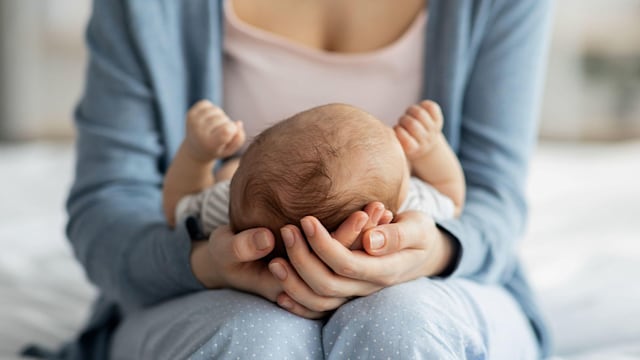Stars such as Stacey Solomon and Adele have spoken out about their experience with postnatal depression and it's a condition which can affect 1 in 10 women. The 3-8 May is Maternal mental health awareness week, making it the perfect time to highlight the real-life struggles of being a new parent.
STORY: Postpartum psychosis: the crippling mental health illness as explained by Laura Dockrill
Jodie, 33, Bristol felt feelings of "guilt", "shame" and "helplessness" when she was in the throes of postnatal depression, but here's what happened when she told her midwife and got help from local charity, Bluebell Care.
WATCH: Celebrity baby bumps over the years
What is postnatal depression?
The NHS website states that "postnatal depression is a type of depression that many parents experience after having a baby. It's a common problem, affecting more than 1 in every 10 women within a year of giving birth. It can also affect fathers and partners."
Jodie, what were the symptoms you experienced with postnatal depression?
Despite having so much to be happy about with a new baby in my arms, I often struggled to find a sense of joy. Even though I longed to feel lighter and brighter, time would pass where I felt heavy, helpless, and numb. I often had feelings of complete overwhelm, I couldn’t see how I would be able to get through the day. I cried a lot. Often, I couldn’t explain why - I just felt so, so sad.
I'd then feel guilty for feeling sad, thinking "how can I feel like this when I have so much to be thankful for". It was also hard to share these feelings, I'd feel ashamed to tell even my closest friends or family, in case they questioned if I was ok to care for my son or if they thought less of me as a mother.
There is a lot of pressure on new parents
What help did you seek for your postnatal depression?
I reached out to my midwife at about seven months pregnant, when I first started to feel waves of depression. She reassured me prenatal and postnatal depression are common and she referred me to Bluebell. I was assigned a 'Bluebell Buddy’, who was an absolute lifeline for my really tough days and always at the end of the phone if I needed her.
READ: Frankie Bridge reveals mental health struggle amid Loose Women break
MORE: When mums multi-think: why we do it and how to stop
I have experienced depression before, so I also tried to practice as many of the things that I knew were helpful for me in the past; gentle exercise like walking and yoga, talking and being honest about my thoughts and feelings to my family and closest friends, and positive phrases to focus on during the day, like "this too shall pass".
What was the hardest part of postnatal depression for you?
I remember crumbling one day and saying to my husband I just felt like my son was 'taking everything from me' rather than I was able to 'give to him'. It felt crushing that I could feel that way towards someone so small and new to the world. I felt guilty for feeling so low, and at times being all consumed by it. I was always hoping that everything would be ok in the end, but deep down it felt like this was it. This was motherhood. And I didn't know how I would ever get better.
What advice would you give to someone suffering now?
Know that you can get better - there are some amazing resources and support out there. The first thing to do is take a deep breath - and then ask for help. Talk to your Midwife or Health Visitor. Talk to your partner if you can.
The most surprising support I found was talking with other new mothers, some who I had only just met, (Bluebell also offer coffee mornings where I met some lovely mums in the same boat as me). Even if you don’t talk directly about postnatal depression, having a shared connection with someone else on the same journey as you can be very supportive and comforting. It helps remind you that even though you might feel it, you are absolutely not alone.
If you're struggling to cope then speak out
READ: 14 wellness trends to try to help manage your anxiety
What can you do if you (or someone you know) is experiencing symptoms of PND?
The best thing to do if you think you are experiencing postnatal depression is to reach out to a healthcare professional. Talking to your friends and family is great but speaking to someone like a midwife or a GP will ensure you get the medical help that you need. Also, use resources like Bluebell Care, PANDAS and Mind to get advice and coping techniques. Just remember, you are not alone.
What is Bluebell Care?
Bluebell Care is a charity founded 10 years ago by Ruth. They operate in Bristol, Bath, North East Somerset, South Gloucestershire and parts of Devon. Their focus is supporting parents' mental health and wellbeing during pregnancy and birth - and beyond.
Like this story? Sign up to our HELLO! newsletters to get other stories like this delivered straight to your inbox.
